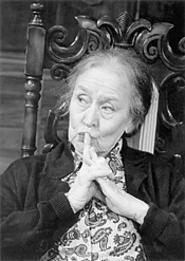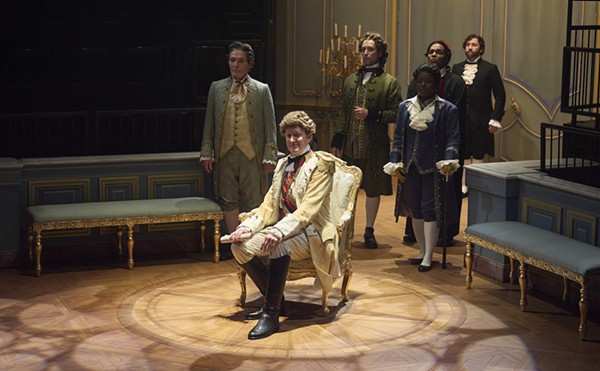If you've ever seen daredevil Evel Knievel roar off the end of a motorcycle ramp and hurtle through the air toward the other side, you know all about the risk-reward ratio. Should he stick the landing, cheering will ensue; but if he wipes out, the audience will fall deadly silent. It's pretty much the same way with staged monologues, where just one actor delivers all the lines. The similarity is relevant, because one of the few sights as ghastly as old Evel cartwheeling his shattered bones across a patch of asphalt is watching a single actor slowly disintegrate onstage, with nothing and no one around to help.
Beck Center has set up the ramps for two solo performers in Talking Heads, a pair of mordantly funny monologues by Alan Bennett, and both theatrical jumps are handled splendidly -- with one performance nearly approaching perfection. Bennett, who adapted The Madness of King George for film, is a Brit who originally co-authored and starred in that much-lauded satirical revue of the '60s, Beyond the Fringe. In Talking Heads, the playwright exposes his drily humorous takes on the timeless dilemmas of loneliness and sexual repression. Beck Center's two scripts are safely in the hands of the most prestigious couple in local theater, Dorothy and Reuben Silver. When one is acting in this production, the other is directing, and since each knows the other's instincts and rhythms, the result is a virtually flawless evening of theater.
In his monologue, "A Chip in the Sugar," Reuben Silver plays apron-bedecked Graham Whittaker, a fiftysomething man still living with his afflicted mother, Vera. As Graham says, "She isn't deaf -- but it's one of the few things she isn't." Graham is in a dither about an old flame of his mother's, Frank Turnbull, who shows up, in snazzy Italian shoes, to literally sweep Vera out of her house slippers. Graham tags along on a couple of their dates and turns up his nose at Turnbull's restaurant choice (it was decorated all in red, and they served cheeseburgers!). Just when it seems Mom is ready to marry this Lothario, events transpire that plop Vera and son back into their humdrum life of petty bickering. Along the way, both Turnbull and Vera take turns needling Graham -- for his maternal dependence, at his advanced age, and for his suspected homosexual leanings. Even the folks in Graham's group therapy session gang up on him.
Mr. Silver looks perfect as the soggy, toupee-topped Graham, and he plays this sad sack with a fussily aggravating precision that seems totally believable. At times, though, one wishes that Silver would take more chances with this emotional wreck of a human being, who clearly cannot find himself amid all the doily-straightening of his dead-end life. Even so, there are a number of laughs, sympathetic and otherwise, to be had at poor Graham's expense.
In the second monologue, "Bed Among the Lentils," Dorothy Silver appears as Susan, the alcoholic wife of a small-town English vicar, and this is the cue to fasten your seat belts. After only two steps onto the stage, it's clear who Susan is, by her wincing reaction to the omnipresent peal of the steeple bells. She veers over to the side cabinet to chug some communion wine, then sits to share her misery with us. It turns out that she doesn't believe in God, is pretty fed up with her smarmy husband, Geoffrey, and can't tolerate the gushy women parishioners who fawn all over him (she calls them "the fan club"). Susan just can't understand why a vicar's wife is expected to go to church all the time, when a lawyer's wife doesn't have to attend court proceedings. And then she relates an epiphany -- and a hop onto the wagon -- that she experienced, thanks to the romantic owner of an Indian food market in a nearby town. The affair doesn't last, but Geoffrey wastes no time in claiming false credit for her new sobriety, which drives her even crazier.
Dorothy Silver is hysterically funny and enormously touching, because she is completely immersed in Susan's savage cynicism as well as her ultimate redemption. Silver's gradual inebriation as she relates a story about flower arranging in the church is a comic gem of barely restrained contempt -- both for the ditzy women among the floral volunteers and for her own ruined midlife dreams.
Clearly, the faces of the Silvers should be federally protected as historical sites, they are so expressive and wondrous. But Dorothy Silver's monologue is a work of rare expertise, at once superbly controlled and spontaneous. In fact, there are only two kinds of people who should see her remarkable performance: anyone who has ever wanted to act -- and everyone else.













